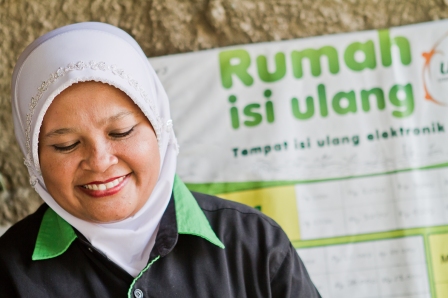By Christopher Tan, Chief Executive Officer, Asia Region, Grameen Foundation
Christopher (“Happy”) Tan is Grameen Foundation’s CEO for the Asia Region, where he is responsible for defining and executing the organization’s regional long-term strategy and overseeing its various investments and programs there. A native of the Philippines, he has almost 15 years of experience in development finance, nonprofit management and public interest law, having worked for ShoreBank Advisory Services (SAS), the Local Initiatives Support Corporation (LISC/Chicago) and SALIGAN in the Philippines. He holds an MPP from The University of Chicago and a JD from the Ateneo de Manila University.
I am delighted to announce that Grameen Foundation’s Mobile Microfranchising and AppLab initiatives in Indonesia were recognized at the 2012 Citizens Awards, sponsored by the American Chamber of Commerce Business Civic Leadership Center (BCLC) and held on December 6 in Washington, D.C. Our project partner, Qualcomm – through its Wireless Reach initiative ™ – received the “Best International Ambassador” award for its collaborations with Grameen Foundation and our local partner, the social enterprise Ruma, on these projects.
The award identifies a successful social, community or environmental initiative that positively impacts one or more developing countries.
Through our project with Wireless Reach and Ruma, we have enabled poor entrepreneurs, most of whom are women, in Indonesia to offer a range of mobile phone-based services to people in their communities. This effort provides a profitable business opportunity to those living below the poverty line while giving communities access to information and services that can increase their income and improve their lives.
Grameen Foundation and Qualcomm believe that mobiles phones play a critical role in alleviating poverty. This recognition from BCLC highlights the growing support for that vision.
Our experience in Indonesia, a vast country of more than 16,000 islands and 234 million people, is providing important insights about the benefits of mobile connectivity. With approximately 75 percent of the population living below $2.50 per day, the lack of affordable access to telecommunications remains a problem, which places a large percentage of Indonesians in rural areas at an economic and social disadvantage. However, the availability of affordable mobile phones and a rapidly growing 3G network is enabling rural communities, through our AppLab project, to access high-value social applications via mobile phones to close information gaps and reduce market inefficiencies.

On average, these entrepreneurs have increased their income by $1.10/day by providing mobile-based services in their communities.
As of November 2012, more than 15,000 Ruma entrepreneurs have served more than 1.5 million unique customers. More than 82 percent of the businesses are owned by women and 100 percent of Ruma entrepreneurs are profitable. We have also found that, on average, the entrepreneurs increased their income by $1.10/day, which is a substantial increase in their livelihood (63% of the portfolio lives on less than $2.50/day).
These results have been more than encouraging. We have seen a steady increase in overall living conditions for micro-entrepreneurs such as Ibu Nur Zanah, who operates a home-based business that sells used clothes, while her husband sells soup on the street. Their household lives on approximately $2.00 per day, which barely provides for their two children, aged seven years and 15 months. As a Ruma Entrepreneur, Ibu increased her household income by 100%, earning an additional $2.00 per day, moving her family above the poverty line. The ultimate goal for the Mobile Microfranchising and AppLab projects is to empower more entrepreneurs like Ibu Nur Zanah.
We are honored that our program has been recognized by BCLC, and proud to be working with Qualcomm and Ruma on projects that demonstrate the significant impact that mobile technology provides for people who were previously technologically isolated. We look forward to expanding these projects to further help, encourage and move more people and communities above the poverty line.

 Financial inclusiveness is a core tenet of our work at Grameen Foundation. Utilizing mobile phones for financial services has gained a lot of traction as a sustainable and scalable solution to serve the 2.5 billion people who do not have access to formal banking services. But does this solution really enable us to reach all of these people?
Financial inclusiveness is a core tenet of our work at Grameen Foundation. Utilizing mobile phones for financial services has gained a lot of traction as a sustainable and scalable solution to serve the 2.5 billion people who do not have access to formal banking services. But does this solution really enable us to reach all of these people?









